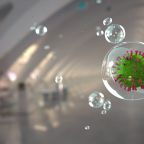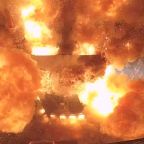Search results

In the current Covid 19 pandemic, airborne aerosols that contain viruses are considered to be an important transmission route, especially in insufficiently ventilated rooms. To be able to make a sound assessment of the related risk of infection and to derive appropriate recommendations for action, the aerosol behaviour as well as representative ambient conditions must be considered in detail and realistically. Within the framework of the AeroCoV research project, scientists of GRS have applied the COCOSYS simulation code – which was developed and validated for the analysis of accidents and severe accidents in containments of nuclear power plants – for the first time for calculating the dispersion of SARS-CoV-2 aerosols.

GRS is currently conducting research in the HEAF projectof the Committee on the Safety of Nuclear Installations (CSNI) on the subject of fire protection in nuclear installations. The CSNI is an international body of the Nuclear Energy Agency (NEA) of the Organisation for Economic Cooperation and Development (OECD). It coordinates all NEA projects dealing with the safety of nuclear installations.
The issue of the safe nuclear waste management is the focus of this year’s EUROSAFE Forum taking place on 4th and 5th November 2013 in Cologne. More than 350 representatives of scientific-technical expert and research organisations, authorities, the nuclear industry and non-governmental organisations from Germany and abroad are expected to convene at Gürzenich in Cologne.
ATHLET stands for "Analysis of Thermal Hydraulics of Leaks and Transients". The ATHLET thermal hydraulics code developed by GRS analyses the entire spectrum of events and accidents to be assumed in nuclear reactors. The simulation code, which is used worldwide, allows the assessment of the safety of reactors of different construction lines and designs.
GRS offers seminars for the training and further qualification of the personnel of nuclear authorities. The seminars, which are funded by the Federal Ministry for the Environment, convey the current state of the art in science and technology on numerous topics from the fields of nuclear safety, disposal and radiation protection.
With the series of events "Exchange of experience on topics of enforcement in radiation protection", GRS informs about twice a year about current regulatory developments in the field of radiation protection.
Every year, GRS takes part in the Open Day of the Garching Research Campus near Munich.
EUROSAFE is an international conference on nuclear safety. The event is organised by the European Technical Safety Organisations Network (ETSON).
Once a year, GRS organises a workshop on the safety of extended dry storage of spent nuclear fuel (SEDS).
The ATHLET-CD (Core Degradation) code has been developed and validated for accidents resulting in major core damage. The development and integration of models in ATHLET-CD is done in close co-operation with the Institut für Kernenergetik und Energiesysteme (IKE), of the University of Stuttgart.